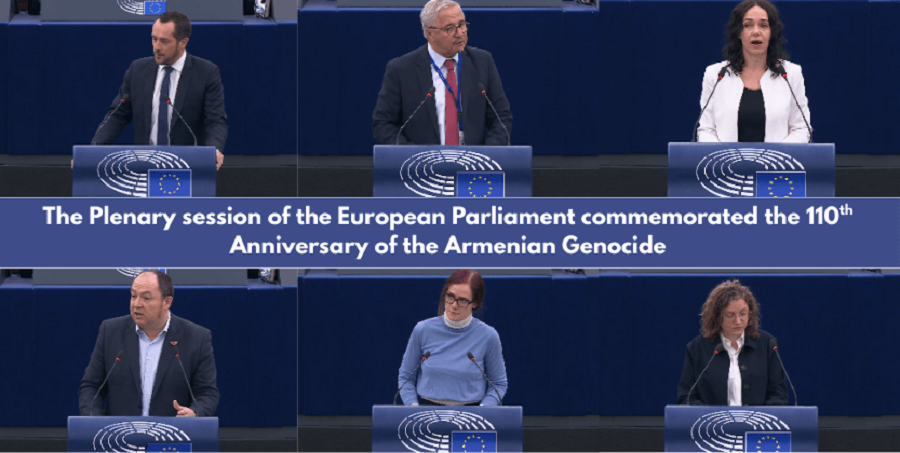BRUSSELS, April 3, 2025 – The European Parliament today held a poignant plenary session commemorating the 110th anniversary of the Armenian Genocide, with numerous Members of the European Parliament (MEPs) drawing stark parallels between the historical tragedy and the recent forced displacement of ethnic Armenians from Nagorno-Karabakh. MEPs passionately called for recognition by Türkiye and Azerbaijan as a crucial step towards reconciliation and strongly criticized the European Union’s continued engagement with Azerbaijan despite its actions.
Miriam Lexmann (EPP) emphasized the fundamental link between recognition and reconciliation, stating,
“The only path to achieve normalization of relations is to recognize and work on recognition. Recognition and reconciliation need courage to confront the past and build a future on historical truth. Most important today with hundreds of thousands displaced from Nagorno-Karabakh because of atrocities committed by Azerbaijan.”
Echoing this sentiment, Yannis Maniatis (S&D) drew a direct line to recent events:
Read also
“Reminds us of recent events in Nagorno-Karabakh where hundreds of thousands were forced to leave their homes, suffering a systematic destruction of their cultural monuments, this is a painful reminder that without memory and recognition the past will repeat itself.”
Maniatis detailed the persecution of Greeks, Armenians and Assyrians in the Ottoman Empire to the forceful depopulation of Nagorno-Karabakh, a comparison that gained further weight when he discussed how his own family was subjected to these persecutions by the Ottoman Empire and became refugees. He further called on the EU to increase its support towards recognition and in pressuring Turkey to recognize “its crimes of the past”.
Several MEPs highlighted the historical context and ongoing threats. Nicolas Bay (ECR) asserted, “110 years ago, the Armenian people were subject to an appalling Genocide by Türkiye, and it has not recognized that act of genocide. For 110 years they have sought to annex Armenian lands and eradicate the Armenian people.” He further called for caution regarding the recent peace negotiations between Armenia and Azerbaijan, stating, “On the peace treaty between Armenia and Azerbaijan, let us not be naïve, the demands by Azerbaijan have shown bad faith by Baku. We need to stand firmly with the Armenian people and ensure any … agreements with Türkiye and Azerbaijan are tied to prior recognition of territorial sovereignty of Armenia and full respect for Armenian people.”
The European Union’s own role and responsibilities in the face of these historical parallels and ongoing crises came under intense scrutiny during the plenary session. MEPs voiced strong concerns about the EU’s current approach, with Marketa Gregorova (Greens) pointedly questioning the Union’s commitment to its values. She argued that the commemoration of past atrocities must translate into action against present injustices, stating that the EU “cannot continue to close our eyes when it is convenient for us.” Gregorova highlighted the recent forced displacement of ethnic Armenians from Nagorno-Karabakh while simultaneously noting the continued import of gas from Azerbaijan by European member states and the maintenance of the memorandum of understanding with Baku. Her call was clear:
“Let us support Armenia, the last remaining democracy in the region.”
The gravity of the situation in Nagorno-Karabakh was further underscored by Pernando Barrena Arza (The Left), who explicitly labeled the events as “ethnic cleansing.” He urged the EU to confront Azerbaijan’s actions and not to forget the plight of the Armenian refugees and political prisoners facing “fake trials and fake rulings.” Barrena Arza insisted on greater EU involvement to ensure a change in Azerbaijan’s attitude and to prevent further violence from both Azerbaijan and Türkiye.
Concluding this critical examination of the present alongside the past, Marie Toussaint (Greens) powerfully emphasized the enduring pain of the Armenian Genocide, describing it as “an open wound in the memory of the Armenian people and the memory of Europeans.” She stressed the moral imperative to keep this memory alive and to actively fight against denial. Toussaint connected the historical injustice directly to the current suffering of Armenians, pointing to the political prisoners in Azerbaijan, the hundred thousand displaced individuals from Nagorno-Karabakh denied their right to return, and the ongoing impact of energy policies. Her poignant observation that “History is repeating itself in other ways but with the same impunity” served as a stark indictment of the present inaction considering past lessons.
The plenary session underscored the European Parliament’s strong condemnation of the ethnic cleansing in Nagorno-Karabakh, on which multiple resolutions have been adopted and reiterated the crucial importance of recognizing the Armenian Genocide as a foundation for lasting peace and reconciliation in the region. MEPs called for a more consistent and principled EU foreign policy that prioritizes human rights and international law over economic interests.
The EAFJD, as a pan-European umbrella organization with chapters in 14 European countries expresses its gratitude towards the MEPs who honored the memory of victims of the Armenian Genocide and continue to shed light on the struggles of the Armenian people, especially the forcefully displaced Armenians of Nagorno-Karabakh. Commenting on the subject, the president of the EAFJD echoed the criticism of several MEPs towards the EU Executive and its lack of political will to use the word “genocide”, adequately show respect and honor the victims of this crime.
EAFJD


















































